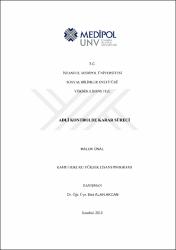| dc.contributor.advisor | Alan Akcan, Esra | |
| dc.contributor.author | Ünal, Haluk | |
| dc.date.accessioned | 2021-08-06T09:14:35Z | |
| dc.date.available | 2021-08-06T09:14:35Z | |
| dc.date.issued | 2019 | en_US |
| dc.date.submitted | 2019-12-11 | |
| dc.identifier.citation | Ünal, H. (2019). Adli kontrole karar süreci. (Yayınlanmamış yüksek lisans tezi). İstanbul Medipol Üniversitesi Sosyal Bilimler Enstitüsü, İstanbul. | en_US |
| dc.identifier.uri | https://hdl.handle.net/20.500.12511/7704 | |
| dc.description.abstract | Adli kontrol, temel hak ve özgürlüklere ağır bir müdahalede bulunan tutuklamaya karşı alternatif bir koruma tedbiri türü olarak ortaya çıkmıştır. Adli kontrol bir koruma tedbiri olarak ceza muhakemesi sistemimize, 5271 sayılı Ceza Muhakemesi Kanunu'nun 109-115. maddeleri arasında düzenlenmesiyle birlikte girmiştir. Yetkili mercilerce adli kontrole; maddi gerçeğin ortaya çıkarılması, delillerin karartılmasının önlenmesi, şüpheli veya sanığın kaçmasının engellenmesi, mağdur, tanık ve diğer kişiler üzerinde baskı yapılmasının önlenmesi için başvurulur. Adli kontrolün içerdiği yükümlülükler ise kişinin temel hak ve özgürlüklerinden birine veya birkaçına müdahale etmektedir. Bu sebeple adli kontrol kararı verilirken hukuka ve kanuna uygun bir şekilde karar verilmelidir. Verilen karara karşı hukuk devleti ilkesi gereği kanun yolu açıktır. Ancak, adli kontrolün hukuka aykırı uygulanması neticesinde ortaya çıkan zararın tazmini konusu 5271 sayılı kanunda yer almamıştır. Çalışmamızda, adli kontrol sürecinin talep ile başlamasından sona ermesine kadar olan konulara değinilmiştir. Ayrıca, verilen adli kontrol kararına karşı itiraz kanun yolu ve adli kontrolün hukuka aykırı uygulanmasından dolayı ortaya çıkan zararın tazmini hususları üzerinde de durulmuştur. | en_US |
| dc.description.abstract | Judicial control has emerged as an alternative form of protection against arrest, which interferes heavily with fundamental rights and freedoms. Judicial control entered our criminal procedure system as a protection measure with the regulation of articles 109-115 of the Code of Criminal Procedure Law No 5271. The competent authorities apply for judicial control to reveal the material truth, to prevent the obscuration of evidence, the escape of suspects or accused, the pressure on victims, witnesses, and other persons. The obligations of judicial control interfere with one or more of the fundamental rights and freedoms of the individual. For this reason, the decision of judicial control should be decided in accordance with the law and the law. In accordance with the principle of the rule of law, the remedy against the decision is open. However, the issue of compensation for the damage caused as a result of the unlawful implementation of judicial control was not included in the 5271 law. In this study, the subjects about the processes from the beginning with the demand to the end of judicial control were discussed. In addition, the subjects about the way to appeal against the judicial control decision and the compensation of the damages arising from the unlawful application of judicial control were also discussed. | en_US |
| dc.language.iso | tur | en_US |
| dc.publisher | İstanbul Medipol Üniversitesi Sosyal Bilimler Enstitüsü | en_US |
| dc.rights | info:eu-repo/semantics/openAccess | en_US |
| dc.subject | Adli Kontrol | en_US |
| dc.subject | Adli Kontrolde İtiraz Kanun Yolu | en_US |
| dc.subject | Adli Kontrolün Hukuka Aykırı Uygulanması | en_US |
| dc.subject | Alternatif Bir Koruma Tedbiri | en_US |
| dc.subject | Tazminat | en_US |
| dc.subject | An Alternative Protective Measure | en_US |
| dc.subject | Compensation | en_US |
| dc.subject | Illegal Implementation of Judicial Control | en_US |
| dc.subject | Judicial Control | en_US |
| dc.subject | The Law of Appeal in Judicial Control | en_US |
| dc.title | Adli kontrole karar süreci | en_US |
| dc.title.alternative | Decision process in judicial control | en_US |
| dc.type | masterThesis | en_US |
| dc.department | İstanbul Medipol Üniversitesi, Sosyal Bilimler Enstitüsü, Kamu Hukuku Ana Bilim Dalı | en_US |
| dc.relation.publicationcategory | Tez | en_US |


















